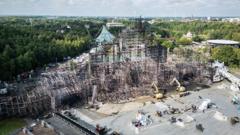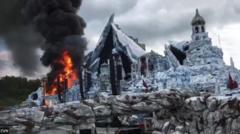**The Grenfell Tower, site of a catastrophic fire that claimed 72 lives, will be demolished. The decision has sparked a complex dialogue among survivors and the victims' families.**
**Grenfell Tower to Be Demolished: Mixed Reactions from Survivors and Families**

**Grenfell Tower to Be Demolished: Mixed Reactions from Survivors and Families**
**Government confirms demolition after nearly eight years, provoking strong emotional responses from those affected.**
The Grenfell Tower, a haunting reminder of one of Britain's deadliest residential fires that took place nearly eight years ago, is set to be demolished, finally confirmed by the British government on Friday. The decision follows extensive public inquiry findings, which pointed to a combination of neglect and regulatory failures that contributed to the blaze that resulted in 72 fatalities.
Angela Rayner, the deputy prime minister, shared the government's intentions with the families of victims ahead of the formal announcement, causing a rift among those affected. Some family members expressed anger at the plan to demolish the tower before full accountability was achieved, whilst others acknowledged the building's condition was unsustainable for the long-term.
This debate mirrors discussions surrounding the aftermath of tragedies like the 9/11 attacks in the United States and the Oklahoma City bombing, where locations of distress transform into sites of remembrance and intense emotion.
In her statement, Rayner noted that demolition will occur systematically over a span of two years, preserving certain parts of the structure and some materials for inclusion in a future memorial. The government’s carefully considered announcement emphasized the complicating emotional aspects involved: “The tower was the home of the 72 innocent people who lost their lives, and of survivors whose lives were forever changed. It is clear from conversations it remains a sacred site. It is also clear that there is not a consensus about what should happen to it.”
The narrative surrounding Grenfell Tower reflects deep feelings of loss and the quest for justice, as those impacted wrestle with their memories and the reality of moving forward from this national tragedy.
Angela Rayner, the deputy prime minister, shared the government's intentions with the families of victims ahead of the formal announcement, causing a rift among those affected. Some family members expressed anger at the plan to demolish the tower before full accountability was achieved, whilst others acknowledged the building's condition was unsustainable for the long-term.
This debate mirrors discussions surrounding the aftermath of tragedies like the 9/11 attacks in the United States and the Oklahoma City bombing, where locations of distress transform into sites of remembrance and intense emotion.
In her statement, Rayner noted that demolition will occur systematically over a span of two years, preserving certain parts of the structure and some materials for inclusion in a future memorial. The government’s carefully considered announcement emphasized the complicating emotional aspects involved: “The tower was the home of the 72 innocent people who lost their lives, and of survivors whose lives were forever changed. It is clear from conversations it remains a sacred site. It is also clear that there is not a consensus about what should happen to it.”
The narrative surrounding Grenfell Tower reflects deep feelings of loss and the quest for justice, as those impacted wrestle with their memories and the reality of moving forward from this national tragedy.





















